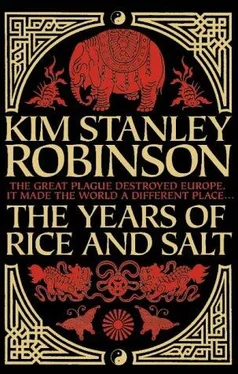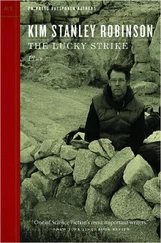Kim Robinson - The Years of Rice and Salt
Здесь есть возможность читать онлайн «Kim Robinson - The Years of Rice and Salt» весь текст электронной книги совершенно бесплатно (целиком полную версию без сокращений). В некоторых случаях можно слушать аудио, скачать через торрент в формате fb2 и присутствует краткое содержание. Год выпуска: 2003, ISBN: 2003, Издательство: Bantam Books, Жанр: Альтернативная история, на английском языке. Описание произведения, (предисловие) а так же отзывы посетителей доступны на портале библиотеки ЛибКат.
- Название:The Years of Rice and Salt
- Автор:
- Издательство:Bantam Books
- Жанр:
- Год:2003
- ISBN:0-553-10920-0
- Рейтинг книги:5 / 5. Голосов: 1
-
Избранное:Добавить в избранное
- Отзывы:
-
Ваша оценка:
- 100
- 1
- 2
- 3
- 4
- 5
The Years of Rice and Salt: краткое содержание, описание и аннотация
Предлагаем к чтению аннотацию, описание, краткое содержание или предисловие (зависит от того, что написал сам автор книги «The Years of Rice and Salt»). Если вы не нашли необходимую информацию о книге — напишите в комментариях, мы постараемся отыскать её.
The Years of Rice and Salt — читать онлайн бесплатно полную книгу (весь текст) целиком
Ниже представлен текст книги, разбитый по страницам. Система сохранения места последней прочитанной страницы, позволяет с удобством читать онлайн бесплатно книгу «The Years of Rice and Salt», без необходимости каждый раз заново искать на чём Вы остановились. Поставьте закладку, и сможете в любой момент перейти на страницу, на которой закончили чтение.
Интервал:
Закладка:
It was autumn here, and he began to live like the bears, eating berries and honey, and rabbits shot with the ridiculous bow. Possibly it had been concocted by a child; he couldn’t believe anyone older would make such a thing. It was a single bend of wood, probably ash, partly carved but still misshapen; no arrowrest, no nocking point, its pull like that of a prayer-flag line. His old bow had been a laminate of horn, maplewood, and tendon glue covered by blue leather, with a sweet pull and release, and enough power to pierce body armor from over a li away. Gone now, gone altogether beyond, lost with all the rest of his few possessions, and when he shot these twig arrows with this branch bow and missed, he would shake his head and wonder if it was even worth tracking the arrow down. It was no wonder these people had died.
In one small village, five buildings clustered above a stream ford, the headman’s house proved to have a locked larder, still stocked with dried fishcakes that were spiced with something Bold did not recognize, which made his stomach queasy. But with the strange food in him he felt his spirits rise. In a stable he found sidebags for the mare, and stuffed them with more dried food. He rode on, paying more attention than he had been to the land he was passing through.
White-barked trees hold up black branches,
Pine and cypress still verdant on the ridge.
A red bird and a blue bird sit near each other
In the same tree. Now anything is possible.
Anything but return to his previous life. Not that he harbored any resentment of Temur; Bold would have done the same in his place. Plague was plague, and could not be treated lightly. And this plague was obviously worse than most, having killed everyone in the region. Among the Mongols plague usually killed a few babies, maybe made some adults sick. You killed rats or mice on sight, and if babies got feverish and developed the bumps, their mothers took them out to live or die by the rivers. Indian cities were said to have a worse time with it, with people dying in great crowds. But never anything like this. It was possible something else had killed them.
Traveling through empty land.
Clouds hazy, moon waning and chill.
Sky, frost-colored, cold to look at.
Wind piercing. Sudden terror.
A thousand trees roar in the sparse woodland:
A lonely monkey cries on a barren hill.
But the terror washed through him and then away, like freshets of rain, leaving a mind as empty as the land itself. It was very still. Gone, gone, altogether gone.
For a time he thought he would ride through and out of the region of plague, and find people again. But then he came over a jagged range of black hills, and saw a big town spread below, bigger than any he had ever seen, its rooftops covering a whole valley bottom. But deserted. No smoke, no noise, no movement. In the center of the city another giant stone temple stood open to the sky. Seeing it the terror poured into him again, and he rode into the forest to escape the sight of so many people gone like the autumn leaves.
He knew roughly where he was, of course. South of here, he would eventually come into the Ottoman Turks’ holdings in the Balkans. He would be able to speak with them; he would be back in the world, but out of Temur’s empire. Something then would start up for him, some way to live.
So he rode south. But still only skeletons occupied the villages. He grew hungrier and hungrier. He drove the mare harder, while drinking more of her blood.
Then one night in the dark of the moon, all of a sudden there were howls and wolves were on them in a snarling rush. Bold just had time to cut the mare’s tether and scramble into a tree. Most of the wolves chased the mare, but some sat panting under the tree. Bold got as comfortable as he could and prepared to wait them out. When rain came they slunk away. In the dawn he woke for the tenth time, climbed down. He took off downstream and came on the body of the mare, all skin and gristle and scattered bones. The sidebags were nowhere to be found.
He continued on foot.
One day, too weak to walk, he lay in wait by a stream, and shot a deer with one of the sorry little arrows, and made a fire and ate well, bolting down chunks of cooked haunch. He slept away from the carcass, hoping to return to it. Wolves couldn’t climb trees, but bears could. He saw a fox, and as the vixen had been his wife’s nafs, long ago, he felt better. In the morning the sun warmed him. The deer had been removed by a bear, it appeared, but he felt stronger with all that fresh meat in him, and pressed on.
He walked south for several days, keeping on ridges when he could, over hills both depopulated and deforested, the ground underfoot sluiced to stone and baked white by the glare of the sun. He watched for the vixen in the valleys at dawn, and drank from springs, and raided dead villages for scraps of food. These grew harder and harder to find, and for a while he was reduced to chewing the leather strap from a harness, an old Mongol trick from the hard campaigns on the steppes. But it seemed to him it had worked better back there, on the endless grass so much easier to cross than these baked tortured white hills.
At the end of one day, after he had long gotten used to living alone in the world, scavenging it like Monkey himself, he came into a little copse of trees to make a fire, and was shocked to see one already there, tended by a living man.
The man was short, like Bold. His hair was as red as maple leaves, his bushy beard the same color, his skin pale and brindled like a dog. At first Bold was sure the man was sick, and he kept his distance. But the man’s eyes, blue in color, were clear; and he too was afraid, absolutely on point and ready for anything. Silently they stared at each other, across a small clearing in the middle of the copse.
The man gestured at his fire. Bold nodded and came warily into the glade.
The man was cooking two fish. Bold took a rabbit that he had killed that morning out of his coat, and skinned and cleaned it with his knife. The man watched him hungrily, nodding at each familiar move. He turned his fish on the fire, and made room in the coals for the rabbit. Bold spitted it on a stick and put it in.
After the meat had cooked they ate in silence, sitting on logs on opposite sides of the fire. They both stared into the flames, glancing only occasionally at each other, shy after all their time alone. After all that it was not obvious what one could say to another human.
Finally the man spoke, first brokenly, then at length. Sometimes he used a word that sounded familiar to Bold, but not so familiar as his movements around the fire, and no matter how hard he tried, Bold could make nothing of what the man said.
Bold tried out some simple phrases himself, feeling the strangeness of words in his mouth, like pebbles. The other man listened closely, his blue eyes gleaming in firelight, out of the dirty pale skin of his lean face, but he showed no sign of comprehension, not of Mongolian, Tibetan, Chinese, Turkic, Arabic, Chagatai, or any other of the polyglot greetings Bold had learned through the years crossing the steppe.
At the end of Bold’s recitation the man’s face spasmed, and he wept. Then, wiping his eyes clear, leaving big streaks on his dirty face, he stood before Bold and said something, gesturing widely. He pointed his finger at Bold, as if angry, then stepped back and sat on his log, and began to imitate rowing a boat, or so Bold surmised. He rowed facing backward, like the fishermen on the Caspian Sea. He made the motions for fishing, then for catching fish, cleaning them, cooking them, and feeding them to little childen. By his gestures he evoked all the people he had fed, his children, his wife, the people he lived with.
Читать дальшеИнтервал:
Закладка:
Похожие книги на «The Years of Rice and Salt»
Представляем Вашему вниманию похожие книги на «The Years of Rice and Salt» списком для выбора. Мы отобрали схожую по названию и смыслу литературу в надежде предоставить читателям больше вариантов отыскать новые, интересные, ещё непрочитанные произведения.
Обсуждение, отзывы о книге «The Years of Rice and Salt» и просто собственные мнения читателей. Оставьте ваши комментарии, напишите, что Вы думаете о произведении, его смысле или главных героях. Укажите что конкретно понравилось, а что нет, и почему Вы так считаете.












